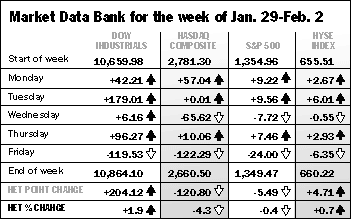Associated Press

NEW YORK - With corporate earnings season almost over and two interest rate cuts under its belt, the stock market might appear poised for a February rally.
Unfortunately, the outlook remains murky. Despite the Federal Reserve’s best efforts, Wall Street is having trouble shaking its fears about the future.
Blue-chip and technology stocks fluctuated last week, as they did throughout January, on investors’ reactions to poor economic news and disappointing earnings. The Federal Reserve’s two interest rate cuts - one at the beginning of January, the other this past week - soothed some of those worries, but the upturn was untenable as stocks vacillated.
"There’s the fear that before the Fed’s policy kicks in and shows up on companies’ bottom lines, which will be at least a 6-month lag, we’re going to have to go through some awful earnings," said Larry Wachtel, market analyst at Prudential Securities. "That’s what’s keeping some investors and the market back."
Wachtel said the markets may feel the full effect of those worries in February. He maintains that a lot of January’s gains - which included a 12 percent bump up in the Nasdaq composite - reflected seasonal trends.
The beginning of the year is traditionally the time when new money flows into retirement accounts and when Americans invest their year-end bonuses.
Also, the rock-bottom stock prices found in early January are gone, particularly in the battered tech sector. Microsoft is up about 40 percent; IBM has gained some 30 percent.
Of course, February does have some trends in its favor. One significant factor: a lack of corporate earnings news. First-quarter warnings and outlooks for fiscal 2001 likely won’t begin until early March.
"We just won’t have this bad news hitting us over the head every day," said Bill Barker, investment strategy consultant with Dain Rauscher. "There’s a lot of money to be spent out there, and typically from November to April is a generally decent time for the market."
There will still be lots of economic data, however, ranging from government unemployment reports to industry outlooks. And Federal Reserve Chairman Alan Greenspan gives his annual report and testimony to Congress in mid-February.
But the prospects of a February interest rate cut similar to the two that lifted stocks in January are debatable. The Fed isn’t scheduled to meet again until the end of March, and - short of very negative economic news that catches it off guard - most analysts believe another such cut is unlikely.
So far, two February reports have provided evidence the economy was slowing. On Thursday, the National Association of Purchasing Management said manufacturing activity last quarter was at its lowest point in nearly a decade. And the Labor Department said Friday that unemployment was at its highest level in 16 months.
Analysts aren’t sure if that will be enough to get another cut, but they point out the month is young and there’s plenty of time for more bad news to come out.
They caution, though, against hoping for too much negative news. The backbone of a recovery may ultimately rest on consumers’ backs - and no one wants them to become too nervous to buy.
"We want that interest rate cut, but if consumer confidence continues to erode, people aren’t going to buy, no matter how low rates go," said Brian Belski, a fundamental market strategist with U.S. Bancorp Piper Jaffray.
The major market indexes ended the week mixed.
The Dow rose 204.12 points, a 1.9 percent increase, to 10,864.10 for the week despite a 119.53-point drop on Friday.
But broader market indexes finished the week lower. For the week, the Nasdaq composite index lost 120.80, or 4.3 percent, to 2,660.50 after falling 122.29 on Friday.
The Wilshire Associates Equity Index - which represents the combined market value of all New York Stock Exchange, American Stock Exchange and Nasdaq issues - ended the week at $12.44 trillion, down about $1.16 trillion from the previous week. A year ago the index was $13.60 trillion.
[back to top] |

